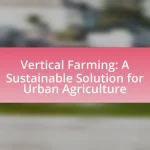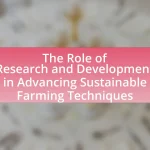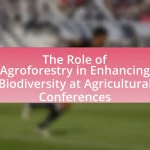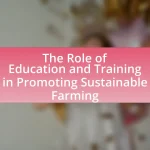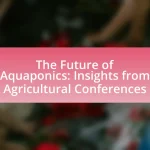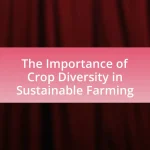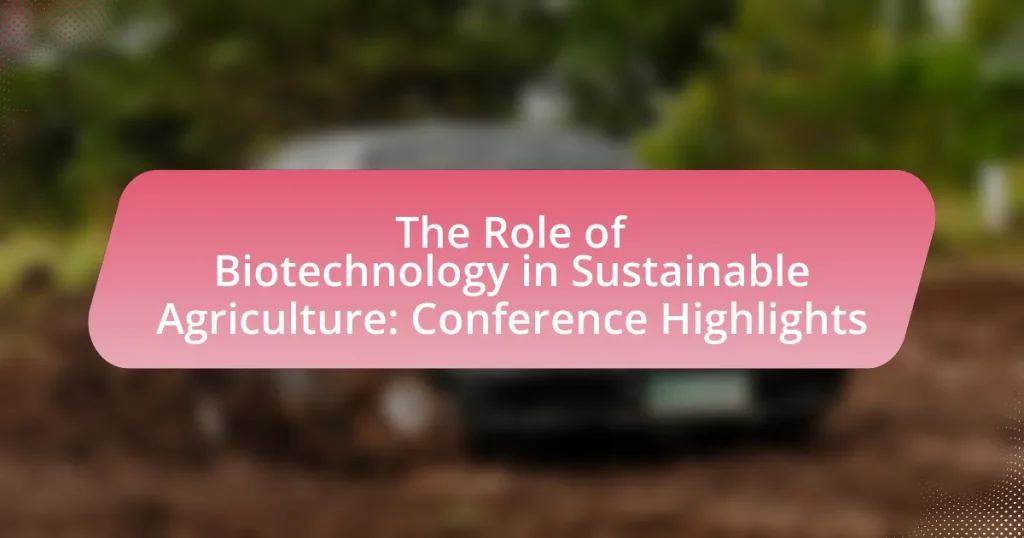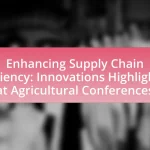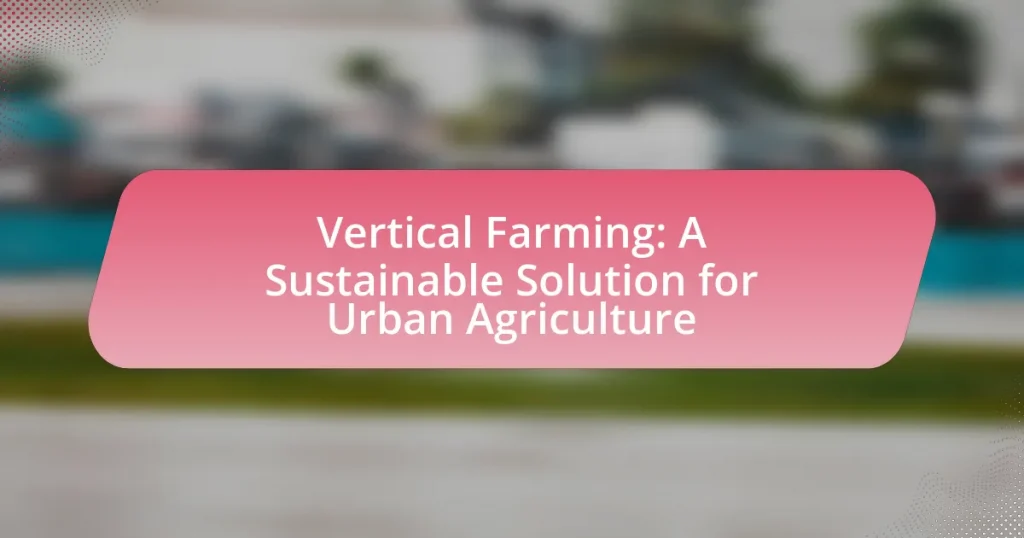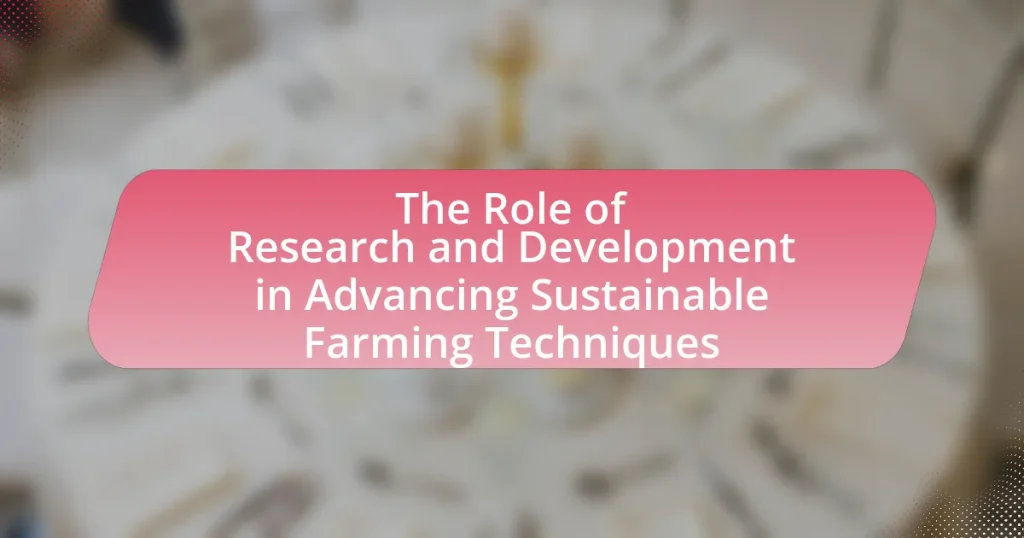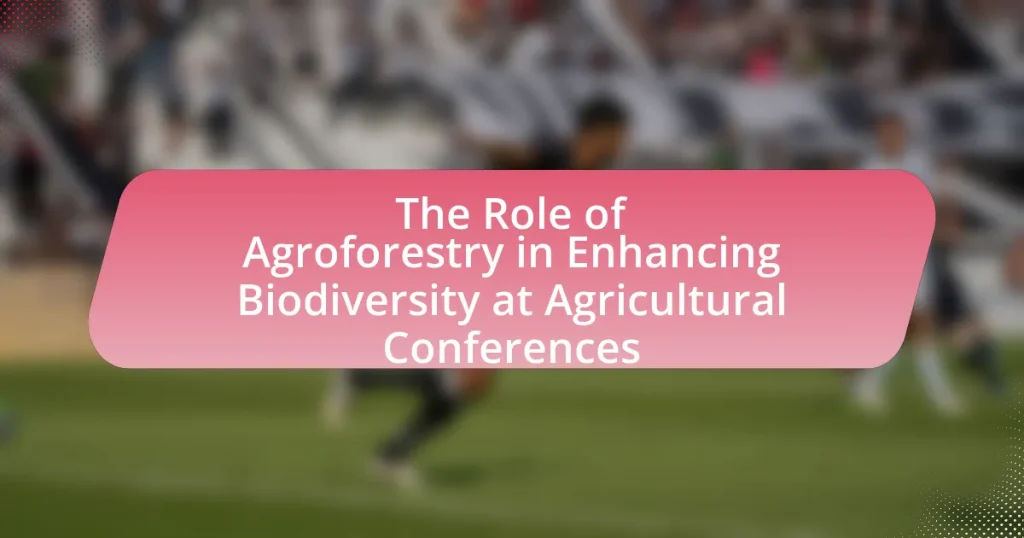The article focuses on the role of biotechnology in sustainable agriculture, highlighting its significance in enhancing crop yields, improving pest and disease resistance, and reducing chemical inputs. It discusses various biotechnological methods, such as genetic engineering and CRISPR, that contribute to crop resilience and efficiency. Key highlights from a recent conference on biotechnology and sustainable agriculture are presented, showcasing successful applications, innovative solutions, and expert opinions on future trends. The article also addresses ethical considerations, challenges in food production, and best practices for integrating biotechnology into farming systems, emphasizing the importance of responsible use and stakeholder engagement.
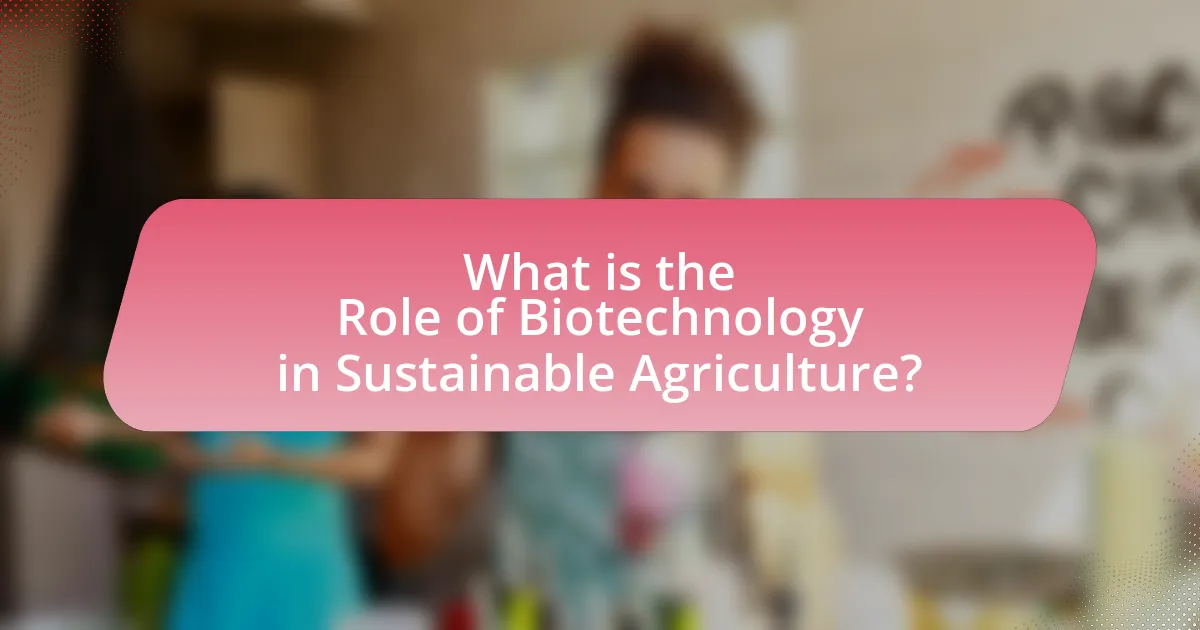
What is the Role of Biotechnology in Sustainable Agriculture?
Biotechnology plays a crucial role in sustainable agriculture by enhancing crop yields, improving resistance to pests and diseases, and reducing the need for chemical inputs. Through genetic modification and other biotechnological methods, crops can be engineered to withstand environmental stresses such as drought and salinity, which is essential for maintaining food security in changing climates. For instance, genetically modified organisms (GMOs) like Bt cotton and Bt corn have shown significant reductions in pesticide use, leading to lower environmental impact and increased farmer profitability. Additionally, biotechnology facilitates the development of biofortified crops, which are enriched with essential nutrients, addressing malnutrition in vulnerable populations. These advancements demonstrate that biotechnology is integral to achieving sustainable agricultural practices that meet global food demands while minimizing ecological footprints.
How does biotechnology contribute to sustainable agricultural practices?
Biotechnology contributes to sustainable agricultural practices by enhancing crop resilience, improving yield, and reducing the need for chemical inputs. Genetic engineering techniques, such as CRISPR and transgenic modifications, allow for the development of crops that can withstand environmental stresses like drought, pests, and diseases. For instance, genetically modified Bt cotton and Bt corn produce their own insecticides, significantly decreasing the reliance on chemical pesticides. According to a study published in the journal “Nature Biotechnology,” the adoption of genetically modified crops has led to a 37% increase in crop yields and a 18% reduction in pesticide use, demonstrating the effectiveness of biotechnology in promoting sustainable farming practices.
What specific biotechnological methods are used in sustainable agriculture?
Specific biotechnological methods used in sustainable agriculture include genetic engineering, tissue culture, and biopesticides. Genetic engineering allows for the modification of crops to enhance traits such as pest resistance and drought tolerance, which can lead to reduced chemical inputs and improved yields. Tissue culture enables the rapid propagation of disease-free plants, ensuring healthier crops and better food security. Biopesticides, derived from natural materials, provide environmentally friendly alternatives to chemical pesticides, minimizing ecological impact while effectively controlling pests. These methods collectively contribute to sustainable agricultural practices by increasing efficiency and reducing reliance on harmful chemicals.
How do these methods enhance crop yield and resilience?
Biotechnology methods enhance crop yield and resilience by enabling the development of genetically modified organisms (GMOs) that are more resistant to pests, diseases, and environmental stresses. For instance, crops engineered to express specific traits, such as drought tolerance or pest resistance, can significantly increase productivity under adverse conditions. Research has shown that Bt cotton, which contains a gene from the bacterium Bacillus thuringiensis, reduces the need for chemical pesticides and increases yield by up to 30% in some regions. Additionally, biotechnological advancements like CRISPR gene editing allow for precise modifications that can improve nutrient use efficiency and stress tolerance, further contributing to higher yields and greater resilience in changing climates.
Why is biotechnology important for food security?
Biotechnology is important for food security because it enhances crop yields, improves resistance to pests and diseases, and increases nutritional value. By utilizing genetic modification and other biotechnological methods, crops can be engineered to withstand environmental stresses such as drought and salinity, which are critical as climate change impacts agriculture. For instance, genetically modified crops like Bt cotton and Bt corn have shown significant increases in yield and reductions in pesticide use, leading to more sustainable farming practices. According to the International Service for the Acquisition of Agri-biotech Applications, in 2020, biotech crops contributed to a 22% increase in global crop yields, demonstrating their effectiveness in addressing food security challenges.
What challenges in food production does biotechnology address?
Biotechnology addresses several challenges in food production, including pest resistance, disease management, and environmental stress tolerance. For instance, genetically modified crops, such as Bt cotton and Bt corn, have been engineered to express proteins that deter pests, significantly reducing the need for chemical pesticides. Additionally, biotechnology enables the development of crops that can withstand drought and salinity, which is crucial as climate change impacts agricultural productivity. According to a report by the National Academies of Sciences, Engineering, and Medicine, genetically engineered crops have led to increased yields and reduced agricultural losses, demonstrating their effectiveness in overcoming these challenges.
How does biotechnology help in reducing agricultural waste?
Biotechnology helps in reducing agricultural waste by enhancing crop efficiency and developing waste-reducing technologies. Genetic engineering allows for the creation of crop varieties that are more resilient to pests and diseases, which decreases the need for chemical inputs and minimizes crop loss. For instance, genetically modified crops like Bt cotton have shown a significant reduction in pesticide use, leading to less agricultural waste. Additionally, biotechnological advancements in microbial applications can improve soil health and nutrient cycling, further reducing waste associated with fertilizers. Studies indicate that these biotechnological approaches can lead to a reduction in agricultural waste by up to 30%, demonstrating their effectiveness in promoting sustainable agricultural practices.
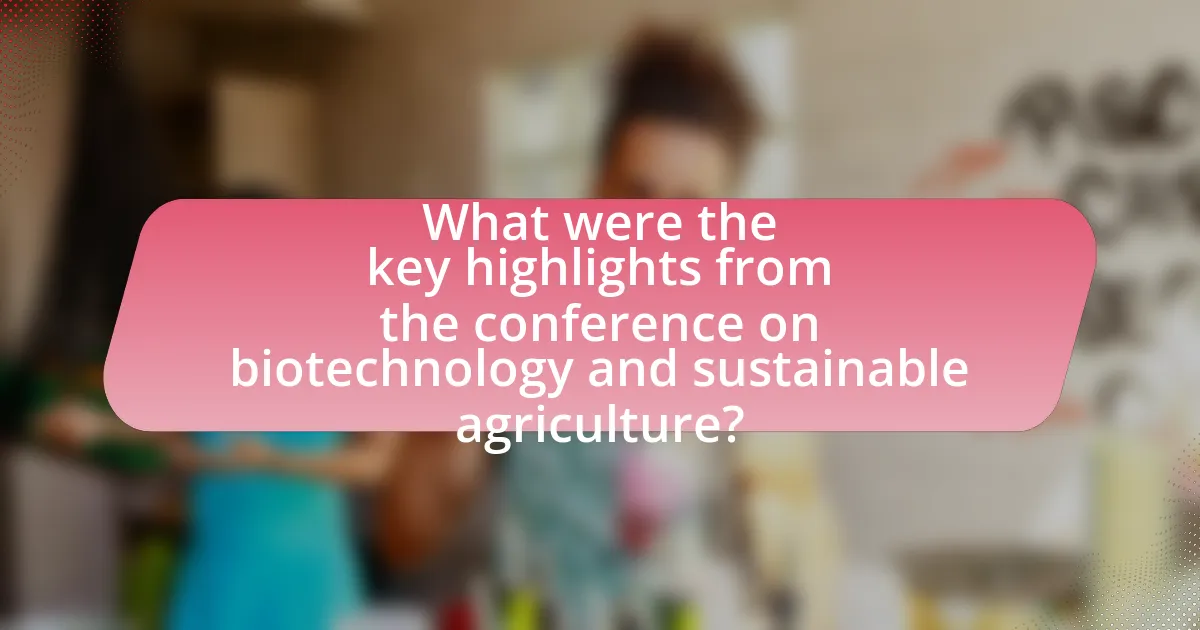
What were the key highlights from the conference on biotechnology and sustainable agriculture?
The key highlights from the conference on biotechnology and sustainable agriculture included advancements in genetically modified organisms (GMOs) that enhance crop resilience and yield, as well as discussions on biopesticides and biofertilizers that reduce chemical inputs. Notably, experts presented data showing that GMO crops can increase yields by up to 22% while decreasing pesticide use by 37%, contributing to more sustainable farming practices. Additionally, the conference emphasized the importance of regulatory frameworks that support innovation while ensuring safety and environmental protection, highlighting case studies from countries that have successfully integrated biotechnology into their agricultural systems.
What innovative biotechnological solutions were presented at the conference?
Innovative biotechnological solutions presented at the conference included CRISPR gene editing for crop improvement, microbial inoculants for soil health enhancement, and bio-based pest management systems. CRISPR technology allows for precise modifications in plant genomes, leading to increased yield and resilience against environmental stressors. Microbial inoculants, such as beneficial bacteria and fungi, promote nutrient availability and improve soil structure, which is essential for sustainable agriculture. Bio-based pest management systems utilize natural predators and biopesticides to reduce chemical pesticide reliance, aligning with sustainable farming practices. These solutions demonstrate the potential of biotechnology to enhance agricultural productivity while minimizing environmental impact.
Which case studies demonstrated successful applications of biotechnology?
Successful applications of biotechnology are demonstrated in case studies such as the development of Bt cotton and Golden Rice. Bt cotton, engineered to express a bacterial toxin that targets specific pests, has led to significant reductions in pesticide use and increased yields in countries like India and the United States. Golden Rice, enriched with Vitamin A through genetic modification, aims to combat vitamin A deficiency in developing countries, showcasing its potential to improve public health. These case studies highlight the effectiveness of biotechnology in enhancing agricultural productivity and addressing nutritional challenges.
What were the expert opinions on the future of biotechnology in agriculture?
Experts predict that biotechnology will play a crucial role in the future of agriculture by enhancing crop resilience, improving yields, and reducing the environmental impact of farming practices. They emphasize that advancements in genetic engineering and molecular biology will enable the development of crops that can withstand climate change, pests, and diseases more effectively. For instance, a report from the Food and Agriculture Organization highlights that biotechnological innovations could increase global food production by up to 70% by 2050, addressing the challenges of feeding a growing population. Additionally, experts advocate for regulatory frameworks that support safe and responsible use of biotechnology to ensure public acceptance and environmental sustainability.
How did the conference address the ethical considerations of biotechnology?
The conference addressed the ethical considerations of biotechnology by facilitating discussions among experts on the implications of genetic modification and its impact on ecosystems and human health. Panelists emphasized the importance of transparency in biotechnological advancements and the need for regulatory frameworks that ensure safety and ethical compliance. Specific case studies were presented, illustrating both the benefits and potential risks associated with biotechnological applications in agriculture, thereby reinforcing the necessity for ongoing ethical scrutiny in the field.
What concerns were raised regarding genetically modified organisms (GMOs)?
Concerns raised regarding genetically modified organisms (GMOs) include potential environmental impacts, health risks, and ethical considerations. Environmental concerns focus on the possibility of GMOs disrupting local ecosystems, leading to reduced biodiversity and the emergence of resistant pests. Health risks are debated, with some studies suggesting potential allergenicity and long-term health effects, although major health organizations assert that GMOs are safe for consumption. Ethical considerations involve the implications of patenting life forms and the control of food supply by a few corporations. These concerns are supported by various studies and reports, including those from the World Health Organization and the National Academy of Sciences, which highlight the ongoing debates surrounding GMOs.
How can stakeholders ensure responsible use of biotechnology in agriculture?
Stakeholders can ensure responsible use of biotechnology in agriculture by implementing strict regulatory frameworks and promoting transparency in biotechnological practices. Regulatory bodies, such as the U.S. Environmental Protection Agency and the European Food Safety Authority, establish guidelines that assess the safety and environmental impact of biotechnological products before they are approved for use. Additionally, stakeholders can engage in public dialogue to educate consumers about biotechnology, fostering trust and understanding. Research indicates that transparent communication about the benefits and risks of biotechnology can enhance public acceptance and informed decision-making, as seen in studies conducted by the Pew Research Center, which found that informed individuals are more likely to support biotechnological advancements in agriculture.
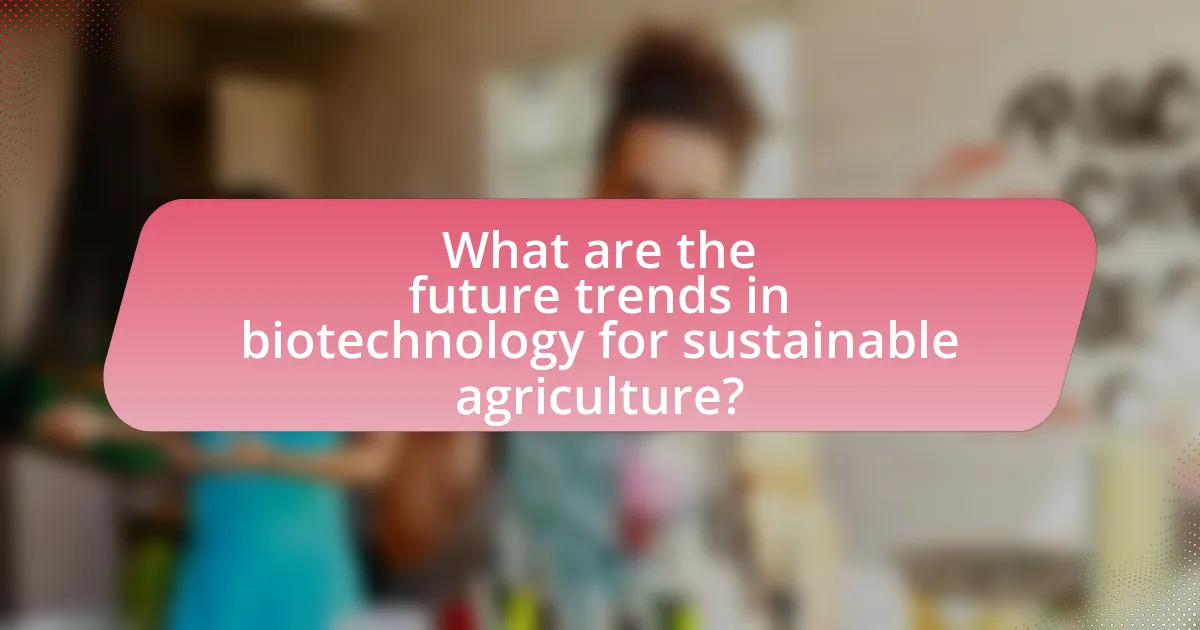
What are the future trends in biotechnology for sustainable agriculture?
Future trends in biotechnology for sustainable agriculture include the development of genetically modified organisms (GMOs) that are more resilient to climate change, the use of CRISPR gene-editing technology for precise crop improvements, and the integration of microbial solutions to enhance soil health and nutrient uptake. These advancements aim to increase crop yields while reducing the reliance on chemical fertilizers and pesticides. For instance, research indicates that CRISPR technology can improve drought resistance in crops, which is crucial as global temperatures rise. Additionally, the application of beneficial microbes can lead to a 20-30% increase in nutrient absorption, promoting sustainable farming practices.
How is research evolving in the field of agricultural biotechnology?
Research in agricultural biotechnology is evolving through advancements in gene editing technologies, such as CRISPR-Cas9, which enable precise modifications of plant genomes. These innovations allow for the development of crops that are more resilient to climate change, pests, and diseases, thereby enhancing food security. For instance, a study published in Nature Biotechnology in 2020 demonstrated that CRISPR can be used to create drought-resistant maize, showcasing the practical applications of these technologies in addressing agricultural challenges. Additionally, the integration of big data and machine learning in agricultural research is facilitating the analysis of genetic information, leading to more informed breeding decisions and improved crop varieties.
What emerging technologies are expected to impact sustainable agriculture?
Emerging technologies expected to impact sustainable agriculture include precision agriculture, biotechnology, and artificial intelligence. Precision agriculture utilizes GPS and IoT sensors to optimize field-level management regarding crop farming, which can lead to reduced resource use and increased yields. Biotechnology, particularly genetic engineering, allows for the development of crops that are more resistant to pests and diseases, thereby decreasing the need for chemical inputs. Artificial intelligence enhances data analysis for better decision-making in farming practices, improving efficiency and sustainability. These technologies collectively contribute to more sustainable agricultural practices by minimizing environmental impact and maximizing productivity.
How can farmers adapt to these new biotechnological advancements?
Farmers can adapt to new biotechnological advancements by integrating genetically modified organisms (GMOs) and precision agriculture techniques into their practices. These advancements allow farmers to enhance crop yields, improve resistance to pests and diseases, and reduce reliance on chemical inputs. For instance, the use of drought-resistant crops can significantly mitigate the impact of climate change on agriculture, as evidenced by studies showing that such crops can increase yields by up to 30% in arid regions. Additionally, adopting precision agriculture tools, such as soil sensors and satellite imagery, enables farmers to optimize resource use and improve overall efficiency, leading to sustainable farming practices.
What best practices can be adopted for implementing biotechnology in agriculture?
Best practices for implementing biotechnology in agriculture include conducting thorough risk assessments, ensuring regulatory compliance, and engaging with stakeholders. Risk assessments help identify potential environmental and health impacts, while regulatory compliance ensures adherence to local and international laws governing biotechnology. Engaging with stakeholders, including farmers, consumers, and policymakers, fosters transparency and builds trust in biotechnological innovations. These practices are supported by studies indicating that effective stakeholder engagement can enhance the adoption of biotechnological solutions, as seen in the 2020 report by the Food and Agriculture Organization, which emphasizes the importance of collaboration in agricultural biotechnology initiatives.
How can farmers effectively integrate biotechnology into their farming systems?
Farmers can effectively integrate biotechnology into their farming systems by adopting genetically modified organisms (GMOs) that enhance crop resilience and yield. For instance, crops engineered for pest resistance reduce the need for chemical pesticides, leading to lower production costs and environmental impact. Research from the National Academy of Sciences indicates that GMOs can increase yields by 22% on average, demonstrating their effectiveness in improving agricultural productivity. Additionally, farmers can utilize biotechnological advancements such as precision agriculture tools, which optimize resource use and minimize waste, further enhancing sustainability in farming practices.
What resources are available for farmers to learn about biotechnology?
Farmers can access various resources to learn about biotechnology, including online courses, agricultural extension services, and research publications. Online platforms like Coursera and edX offer courses specifically focused on agricultural biotechnology, while local agricultural extension offices provide workshops and seminars tailored to farmers’ needs. Additionally, research publications from institutions such as the International Service for the Acquisition of Agri-biotech Applications (ISAAA) and the Food and Agriculture Organization (FAO) offer valuable insights and updates on biotechnological advancements in agriculture. These resources collectively enhance farmers’ understanding and application of biotechnology in sustainable agriculture.
